|
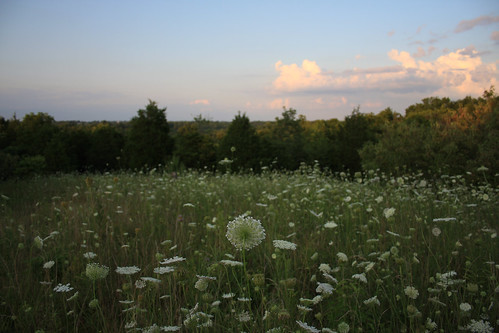
A field of Queen Anne's lace, Daucus carota, near sunset.
(*photo credit)
June 1, 2012 Anticipate Summer's Heat
Some brave souls proclaim, "Bring on the summer!" In an age of global warming and after the warmest winter in memory (the last day almost made 90 degrees here at Ravenna, Kentucky) we may sound a little cavalier in preparing for summer heat and anticipated climate ahead. Here are some offered suggestions made elsewhere but worth repeating:
Stay out of the mid-day sun to the degree possible;
Encourage others to do the same;
Drink plenty of liquids of a non-alcoholic variety;
Find and frequent the shade of a large leafy tree;
Physically exert yourself, but in the cooler parts of the day;
Don't overeat;
Promote watermelon in summertime;
Consider salads from the summer garden;
Do you need to take that auto trip?
Do garden work in the cool of the morning;
Water plants in late evening for maximum moisture benefits;
Mulch to protect from moisture loss;
Air out the house during cooler nighttime;
Close off the house in daytime;
Stay healthy at keep indoor temperatures about 70
(overly-cool, air-conditioned rooms are hard on health);
Use air conditioning only if absolutely necessary;
Get plenty of sleep;
You don't have to imitate the most active neighbor;
Summer reading almost always gets short-changed;
Don't forget to take in a summer festival;
Honestly, this is a good opportunity for retreat time;
Make July 4th a celebration;
Don't forget prayers of thanksgiving in summertime;
Collect jewelweed and make enough ointment for the year;
Protect the skin from sunburn;
If on an all-day hike, at least rest at midday;
Need we say, dress lightly with emphasis on cottons;
Don't let kids get overly heated in sports practices;
Protect self and computer files from lightning storms;
Follow the news forecasts before outdoor plans;
Refresh in -- shower, tub, pool, brook, ocean, puddle;
Try a moment of being barefoot in the grass;
Plan a fall garden;
Stay in touch with political discussions;
Ensure elders are cool, for summers are harder than winters;
Remember that summer is a special time for music;
Sit on a front porch if you are blessed with one;
Avoid recreational mowing;
Give some attention to the favorite Olympics events;
Don't forget, this is perfect time for solar collecting;
Smile in hot weather, for it uplifts everyone.
Prayer: Help us Lord to take each day as it comes, especially in summertime.
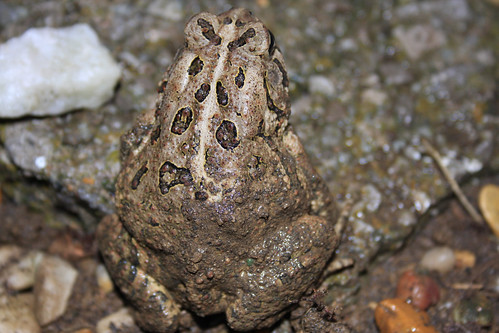
A closer look at the Fowler's toad, Bufo fowleri.
(*photo credit)
June 2, 2012 Is Nuclear Power a Dream Turned into a Nightmare?
Three Mile Island in Pennsylvania (March 28, 1978), Chernobyl in the Ukraine (April 26, 1986), and Fukushima, Japan (March 11, 2011) all have one thing in common; they involved nuclear powerplant accidents, though of different degrees of seriousness. At Fukushima, the March 11, 2011 earthquake and tsunami caused extensive damage and radiation escape at three reactors of a nuclear powerplant complex. This occurred near the Pacific shore affected by the terrible earthquake that killed 30,000 people and destroyed entire towns.
Contrary to assurances by industry and government, nuclear power applications are not always and forever safe -- and not all accidents can be completely avoided. In the 1970s I served on the board of directors of one of the first anti-nuke groups, the DC-based National Intervenors directed by the late Irene Dickinson. Note that many other public interest activist groups of great service-record followed. We wanted a halt to nuclear powerplant construction, and got it for three decades because of their inherent lack of safety. Even today with so-called safer designs we hear the words of optimists, "Nuclear plants can be kept safe only by constantly worrying about their dangers." Special Report on Nuclear Energy, p. 10, The Economist, March 10, 2012.
The original dream was that nuclear power (that great sign of America's guilt for the 1945 bombing of Hiroshima and Nagasaki) would be used as the peacetime atom; it was supposed to furnish nuclear energy for electricity that would be too cheap to monitor. That was the first dream to go bad and increased worries, regulations, and safeguards increased the cost. On the other hand, wind generation as part of the future energy mix is far cheaper, takes far less construction time, and is infinitely safer. Yet the nuclear lobby keeps that dream alive long after the number of power plants has leveled at over four hundred, and total numbers are now in decline. Further, the operable nuclear capacity is also declining, especially in Western Europe. Many of the 1960s vintage power plants have reached the end of their projected and extended life times -- and final disposal of American nuclear wastes from commercial operations is undecided.
The nuclear dreamers contrast their operations with fossil fuel emission problem and global warming expectations; they add that new plant designs call for smaller, more compact, lower-priced and safer power plants. However, the projected first American additional nuclear facility since the 1970s will cost at least eight billion plus dollars, if nuclear proponents and captive legislators have their way. However, active anti-nuke groups are expected to initiate legal actions to stop this possible Georgia-sited facility. Will the phoenix be able to rise again?
Prayer: Lord, give us the courage to show the tie-in with the nightmare of nuclear-weapons proliferation and this continuation of nuclear-power generation throughout the world.
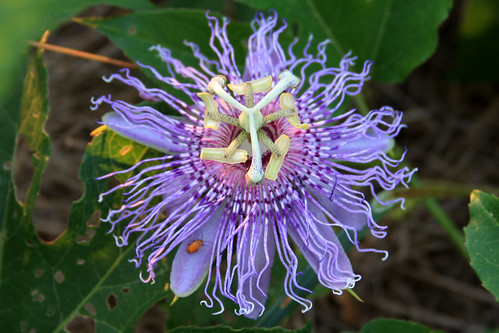
Kentucky native plant, the passionflower - passiflora incarnata.
(*photo credit)
June 3, 2012 The Trinity in Our Lives
How rich are the depths of God -- Who could ever know the mind of the Lord? (Romans 11:33-34)
For Christians, this is the Feast of the Holy Trinity, an embarrassment to some who do not want to say "Father" and "Son" and to others who do not want to believe in this mystery. This redoubles our own efforts to affirm what we hold in the ancient creeds that we recite each Sunday and on feast days: one God and three persons. Our statement is simple; our imaginations are stretched; our words fail us and yet this is what we as a Christian community of two billion people hold in our hearts.
We attempt to live the truths that we hold in some way, but we look for more than words. How can we make the deep mystery of the Trinity alive in our lives? Maybe our respect and reverence holds a key. One possible approach is to consider the deep reverence that we hold for the mystery of all creatures who enter our lives. We know that they are created in the image of God to whom we show deepest reverence. This God is so wrapped in mystery that we do not try to pretend to come to any full understanding.
Secondly, we cannot see God but we do see Jesus Christ who has entered into human history, God becoming one with us. We seek to imitate Jesus who proceeded from the Father and thus this act of Divine Love, which is a gift to us, is accepted in gratitude. Jesus' new commandment given at the Last Supper is that we are to love as he loves us, a command never fully realized. However, we spend a life time attempting to love as Jesus does, and thus enter more deeply into the mystery of Divine Love.
Thirdly, we show the Spirit that proceeds from the Father and the Son who inspires all to enter into the unfolding mighty works of God. The Spirit inspires us to proceed from our expression of love of Christ to do good deeds for others. We accept the command to love by doing good deeds for those who suffer and are in need of our compassion -- and they are all around if we but look. In following the Word we move to deed, and this reflects the dynamics of the Trinity to the best that we can express, for our loving deeds are far mightier than a mere expression in word.
We are able to do three expressions of belief in the Trinity: a deep and profound reverence for all things created and thus for the Creator as well; a universal love for all with whom we come in contact and thus imitating the Son of God as he commanded; and a movement through meaningful deed to assist other people through the inspiration of the Holy Spirit.
Prayer: God, we praise you: Father all-powerful, Christ Lord and Savior, Spirit of love. You reveal yourself in the depths of our being, drawing us to share in your life and your love. One God, three Persons, be near to the people formed in your image, close to the world your love brings to life.
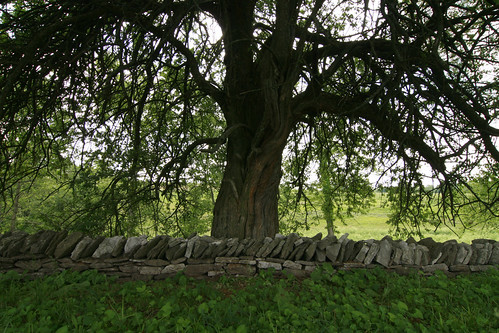
Old stone fence and graceful tree make for a pleasant reading spot.
(*photo credit)
June 4, 2012 Way of the Cross and Social/Environmental Themes
The Way of the Cross is a devotional practice for any time of the year. Here we use Pope John Paul II's alternative to the traditional "Stations of the Cross" as a way of reflecting more deeply on Scriptural narrative. This creative meditative Way is part of Jesus' suffering on the way and at Calvary; this is meant to enhance our compassion for people and our wounded planet. Here
are fourteen stations with social justice and environmental themes:
1. Jesus in the Garden of Gethsemane. (Matthew 25:36-41)
Social -- People are tortured by the ravages of poverty.
Eco -- Garden areas are mistreated and become unproductive.
2. Jesus is Betrayed by Judas and Arrested (Mark 14:43-46)
Social -- People take advantage and betray friends.
Eco -- Plants and animals are mistreated and endangered.
3. Jesus is Condemned by the Sanhedrin. (Luke 22:66-7)
Social -- Caregivers give a helping hand to victims.
Eco -- Greed scars landscape through solid waste pollution.
4. Jesus is Denied by Peter. (Matthew 26:69-75)
Social -- Residents suffer from effects of foul air.
Eco -- Air pollution weakens immunity of the biosystems.
5. Jesus is Judged by Pilate. (Mark 15:1-5, 15)
Social -- People condemned to poverty in slums.
Eco -- Merchants of doubt halt climate-change regulations.
6. Jesus is Scourged and Crowned with Thorns. (John 19:1-3)
Social -- Many people suffer from mental distress.
Eco -- Unmanaged land becomes unproductive.
7. Jesus Bears the Cross. (John 19:6, 15-17)
Social -- People suffer cholera from lack of potable water.
Eco -- Rivers and lakes suffer from water pollution.
8. Jesus is Helped by Simon of Cyrene. (Mark 15:21)
Social -- Citizens take up the cross to assist migrants.
Eco -- People neglect friendly pollinators.
9. Jesus Meets the Women of Jerusalem. (Luke 23:27-31)
Social -- Abortion defies the right to life by and for all.
Eco -- Controlling climate change is a right to life.
10. Jesus is Crucified. (Luke 23:33-34)
Social -- Crass commercialism makes fun of virtue.
Eco -- Earth suffers from rampant visual pollution.
11. Jesus Promises His Kingdom to Good Thief. (Luke 23:39-43)
Social -- We must abolish the death penalty.
Eco -- Wounded Earth has promise of new life.
12. Jesus Speaks to His Mother and John. (John 19:25-27)
Social: Good souls assist the hungry and homeless.
Eco -- We must be willing to radically share with others.
13. Jesus Dies upon the Cross. (Luke 23:44-46)
Social -- People die without proper hospice care.
Eco -- Threatened species are extinguished from Earth.
14. Jesus is Placed in the Tomb. (Matthew 27:57-60)
Social -- Assist all who suffer loss of loved ones.
Eco -- By our help Earth can become renewed.
Prayer: Lord, grant us your strength on our journey of faith.
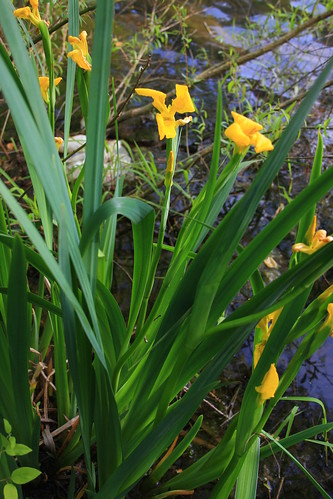
Yellow iris by water's edge. Laurel Co., KY.
(*photo credit)
June 5, 2012 World Environment Day and Conscientious Voting
Each year and especially on World Environment Day we seek to review the environmental situation and speak about aspirations and disappointments. Certainly, 2012 is no exception, especially since as of this writing in early Spring there is such little attention given to environmental issues in this election year. Much is due to there being little appetite in the Republican primaries for such issues and because, with the exception of the Keystone XL Pipeline controversy, there has been little public movement outside of the jobs/economic front on the part of the Administration. To be fair, much in areas of fuel economy, pollution standards soon to be implemented and renewable energy programs is quietly going forward, but this is not getting public discussion.
The main emphasis during this year and into the next ought to be the commitment of the United States to climate-change legislation. Since a treaty may be required, this is being deferred until after the election with the hope of more favorable proponents to champion this critical problem; for, as we say once or more each month, the window of opportunity is closing. Likewise, an anxious world is waiting America to take some favorable step to curb climate-change gases and act responsibly on this issue. Unfortunately, the final results are not totally decided by America. We must convince China, India, and other rising economic powers to follow us and limit greenhouse gases.
Nuclear power is still in the reconstructing stage (see June 2) by those who see it as a phoenix rising anew. The federal loan for building two plants in Georgia has been slowly moving forward, but anti-nuclear groups prepare for legal action to block the construction. Lower-priced, more-rapidly-built, and much safer wind turbines are far outshining the nuclear energy efforts at this time. Biofuels from corn is losing some of its luster and in the non-farm states there has been much concern about rising food prices due to heavy use of corn crops for biofuels (up to 40%). Loss of subsidies by corn producers may reduce corn crop alcohol production to one-third of the crop, with efforts continuing at a slow pace to use other non-food cellulosic sources.
EPA controls on emissions from coal-burning power plants are moving forward with new deadlines coming due, though resistance by producers is immense. The fossil fuel environmental story of the year has been "fracking" to produce more natural gas. While this has led to lower natural gas prices for space heating and industrial uses, still many of us are worried about increased greenhouse emissions from escaping methane; furthermore, use of chemicals in the fracking or drilling fluids is raising alarms in some affected regions where natural gas extracting is centered.
Prayer: Lord, inspire our citizens to turn their attention to the various environmental issues that are now being overlooked due to dominant economic issues. Inspire them to ask questions and to
select candidates wisely.
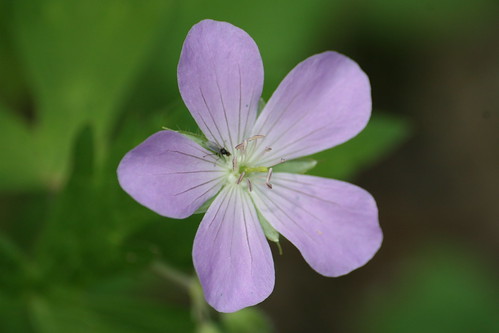
Wild geranium, Geranium maculatum.
(*photo credit)
June 6, 2012 Drill Baby Drill! Cheap Fuel or Cheap Strategy
In this election year filled with promises of all varieties, discerning voters ought to question energy strategies offered by aspiring legislators and presidential candidates. We can improve petroleum supplies through more drilling but nothing like meeting an insatiable fuel demand of a hungry nation or world. "Drill, Baby, Drill!" means that if all restrictions are lifted a freed industry will be coaxed into "liberating" more petroleum and natural gas from fossil fuel-bearing rock formations. Three points are worth considering in the debate occurring right now:
First, fossil fuel extraction IS increasing. In fact, oil and gas production is booming in this country at this time. Currently, not every possible off-shore or wilderness area is open season for drilling, but the vast possibilities, especially from new "fracking" or extracting processes has resulted in a recent abundance of natural gas with both associated benefits and risks. Petroleum extraction is at an eight-year high in America. Utilization of Canadian tar sands is problematic because after all extracting and cleaning and refining, this could prove a rather dirty greenhouse-producing fuel. Simply put, more reliance on fossil fuels is not a good 21st century strategy.
The second point is that bottlenecks and barriers are only partly related to lack of fuel supply in an age of rapidly expanding fuel demands from emerging nations. The growing appetite for liquid fuels is accompanied by temporary disruptions in major fields such as in Nigeria, Libya, and to a smaller extent Syria. A key to fuel prices is relations with Iran and the resulting dangers to ship passage of 40% of transported oil via the Strait of Hormuz. Each delay or failure to return to anticipated schedule (Iraq is quite slow at coming to full former capacity) causes a greater competition for existing fuel supplies -- and thus the $4 plus gasoline at the summer gas pump. Another factor has been closure or reduced capacity at refineries that have tighter regulations and less profit in the refining business.
The third point is that conservation (energy efficiency and smaller number of driving miles this summer) along with the rise of renewable energy production will have much to do with holding down fuel prices by reducing domestic demands. This also is occurring, but not fast enough to overcome the fears of major disruptions through existing and anticipated struggles in the rich Middle East oil-producing regions. A combination of factors leading to tighter supplies and a flux in demands will certainly not be overcome in the next few years by drilling of every conceivable possible oil source. No one likes rising fossil fuel prices, but in reality fuel ought to be more heavily taxed to meet costs from climate- change effects. Failure to address all factors honestly is not a good strategy, no matter who wins the upcoming election.
Prayer: Lord, teach us to be honest in the way we use current and future energy resources.

Close to the forest floor, the small clubmoss reaches for the sun.
(*photo credit)
June 7, 2012 Protection from the Sun
Throughout the winter months we crave the sun and full-spectrum sunlight, and now the sun greets us each morning with its furnace-like blast. We need to be moderate in all things; we ought to accept expert advice and take proper precautions both as healers and potential victims of the sun's rays. In earlier years, a good sunburn was expected in springtime with its pain, redness and peeling skin. However, sunburn is to be avoided:
1. Wear protective clothing. This is strict advice, especially for those of us who hate to wear hats even when we did at parental insistence in younger years. However, the light but covered clothing of summer becomes more needed as we age, for now skin cancer can appear and be devastating without hardly noticing.
2. Use sunscreen. I will leave the discussion of the brand of medication to you and your own caregiver. Perhaps all are effective to some degree but some may be more so, though application of the type, timing, and degree could make a difference. Don't go outdoors without amply covering forehead, nose area, arms, and even legs -- all exposed skin areas.
3. Avoid overexposure. Much of this depends on your own activities at a given time, or if your livelihood requires much outdoor work in summer time. For many of us, we can choose the early morning or late evening hours for outdoor exercise and gardening and thus omit exposure during the middle of the day.
Sunstroke is dangerous and all too often overlooked.
4. Discourage excessive tanning. It always makes some of us cringe to think that people pay to lie under ultraviolet lights to bake in the rays and get a suntan. Really? No wonder some states impose heavy taxes on such operations.
5. Know the signs of skin cancer. This is the hardest of the sun-protection alerts, for no one wants to see any of the scaly skin signs that could be precursors to problems -- and these seem to come to fair skin individuals with the harshness of global warming conditions that we are now enduring.
6. Visit the skin specialist on a regular basis. Our skin is a precious layer that protects us and we must, in turn, protect it. The dermatologist is a friend of our skin and so let's not delay -- and so in writing this in late winter I recommit myself to my annual visit in springtime.
7. And the liquids protect as well. We think of skin but need to remember that dehydration can slip upon us especially when exerting ourselves at this season. Let summer 2012 be a rewarding period of our life.
Prayer: Lord, you give us all good gifts including the sun
that reminds us that we are to be "light" to others.

Ornate foliage of the little brown jug, Hexastylis arifolia.
(*photo credit)
June 8, 2012 On Environmental Issues Remain Non-Partisan
When it comes to promoting more conscientious discernment as election time approaches, we all need to be non-partisan. I guess if you work for a political party this may be seen differently, but the purer democracy of our American founding fathers was in the beginning totally non-partisan, and every ordinary citizen and especially those in leadership roles should aspire to remain so in order to be more effective, especially on critical issues of global significance such as the environment. Non-partisanship counters special interest groups that have excessive sway over political parties. This obscures critical policy areas needing to be addressed today. Non-partisans can demand objectivity in working out such issues. Media outlets all too often prefer a fight, and thus promote partisan sound bites when compromise and working together seems to them less press-worthy.
Non-partisanship is needed on pro-life issues. An excellent example of this is that of the Republican Party which has for the greater part taken a pro-life stance on abortion issues, though not on other major pro-life arenas such as climate-change regulation. Taking a strong position on anti-abortion legislation and ignoring pro-environment issues when Earth's vitality is at stake makes this a tarnished and inconsistent position. The "Partisanization" of environment in the past few years has been a major barrier to needed climate-change legislation. This is not the most pro-life Congress on record when so many members refuse to discuss climate- change issues; rather this is the least pro-life Congress since the first Earth Day in 1970.
On the other hand, a partisan stance has emerged on the free expression of faith when it comes to contraceptive policy. Earth Healing, Inc. was one of 156 groups that signed a New York Times and Washington Post full-page advertisement late last year. We sought the freedom for religious institutions from being coerced to do practices that were contrary to our conscience. Unfortunately, before the dust settles the issue has become highly "partisanized," to the detriment of good compromise and good national health policy. When members of either party become adamant and insist on purity of doctrine or policy, this can become a grave matter, especially when the window is closing on the time to address climate change before major global consequences set in.
Astoundingly, it is an apparent partisanship on the part of moral leaders that must be called into question. Often ideological partisans regard their issues as closed to compromise and readjustment and forget about the need to come to terms on certain differences. In fact, the pro-life advocates, by remaining silent on critical environmental pro-life issues that the vast majority of the world scientific community flags as such, must realize that even remaining silent is partisan.
Prayer: Lord, give us a sense of seriousness in tackling
issues and find that your wish is that we remain non-partisan.

The classic porch swing.
(*photo by Baba Divy, Creative Commons)
June 9, 2012 Promoting Porch Swings on Senior Citizens' Day
Porches do not have the popularity of previous times when people relaxed and invited others to come and sit down with them. Only elders still brave summer heat in shaded porches and relax by abandoning the air-conditioned interior. But the porch beckons with its gear and atmosphere; it is graced with a creaking swing on which the champions of summer heat sit and endure the weather in a special way; the swinging motion gives a special sound; the shade offered is welcomed; a glass of ice tea or hand fans may help.
It is great to discover these specimens of antiquity in our local community, for they give character to our neighborhoods. The sights and sounds remind us of yesteryear, when silence was punctuated with some one-on-one personal communication - a refutation of continuous distant phone contact or the blaring of TV. The swing user says "Stop by and visit; we welcome the lonely seeker of social contact."
I have the hooks on the ceiling of my front porch that is shaded from the afternoon sun. Some generous souls have even offered a swing, but I declined. It gave me second thoughts; however, living at the last house on a no-outlet street, there are few passersby coming this way. Better still, I feel it important to take a needed stroll and find others who brave the swings of summer life and call out in quite quiet ways for people to pause on their walks. It becomes a time to exchange kind words and recall times when even the mid-aged and young had no computer games or air conditioning, and fraternized with co-sufferers of the summer heat.
Will porch swings remain a part of America's landscape? They are close relatives to the rocking chair (February 6, 2011), of which I have one to spend some evening hours. The comforting back-and-forth motion gives a sense of movement while remaining in place, a virtual substitution for the less mobile. Rocking chairs still claim their own place in modern times, but what about porches (June 9, 06) that were built for shade and protection, for comfort and neighborliness? If porches go as part of modern architecture, so will the swing on which they are located. One without the other means the death of a rare and endangered experience.
Some ask if you don't use a porch swing, why lament its demise? Porch swings are a means of communication for the elderly. The use of these comforts gives me hope that a generation long past middle age still retains a love for communication in a random fashion, chance meetings with those who drift by and small talk that is unplanned a moment before spoken. A world of such informality has its tools of delight and the porch swing is one of these. Don't give them to museums. Michael Johnathon has a song "We need a Front Porch" that has some attributes as mentioned here; we also need to sing the praises of a front porch swing.
Prayer: Lord, help us to see good things in life that need to be preserved and used even when it seems they have been supplanted.
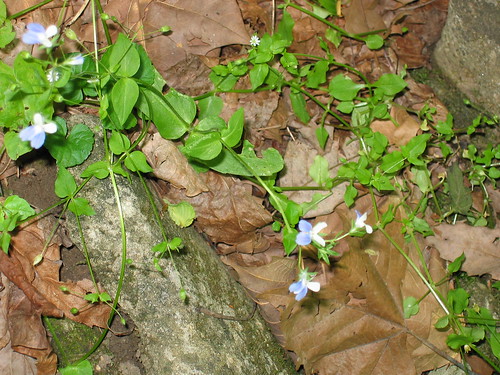
Blue-eyed mary, Collinsia Verna.
(*photo credit)
June 10, 2012 Eucharist as Our Nourishment
On the feast of Corpus Christi we are reminded that we need nourishment during our difficult journey of faith. We need to overcome the barriers from our past. Our allurements and addictions drag us down from moving freely forward and the Bread of Life energizes us to overcome temptation and continue our journey unimpeded. All around us the surroundings are studded with allurements that would delay or detour us to things that seem enticing and comforting. We are tempted to be like those who seem to be enjoying themselves in pursuits not related to the task of travel. We like to deny the storms that caught us in the past and still have a residual hold upon us. We need help to overcome the past and look to the future. This the Eucharist does for us.
Second, the Heavenly Food allows us to set our sights on what is ahead, a future that is beyond the horizon that we barely see while on the road. Our hope is that ultimate success awaits us no matter how uncomfortable the moment and how difficult the journey's hard knocks and ruts. We know the road is the right way to go; we must keep abreast of the conditions as best we can -- the temperature that will soon change, the wind and its force and direction, the possible rain and snow. Gear must be appropriate for these future eventualities. We move forward by a holy impatience because we need to await with expectancy the coming of the Lord to guide us in the final portion of our journey. But our waiting must be that of hope and confidence and active endurance. Yes, we focus in part on a vertical direction, the horizon that is up ahead. This the Eucharist does for us.
Last, we need Eucharistic nourishment to know the present in its fullness. The brief sunlit landscape may seem permanent but it is not; an eternal summer is an illusion. Instead of self- gratification, we must reach out to others who are with us on the road, a looking about in a horizontal plane. We have to be alert and sensitive to co-travelers in place of being totally self-engrossed with only personal needs. By looking about we discern when to pause; like the Good Samaritan we must pick up others who are being pulled by the temptation to stop and become wounded by allurements and addictions all about. Others need our encouragement for we must be people of cheer and freshness, and this involves divine gifts. We need the nourishment to stay alert, enthusiastic, and present for those who otherwise lack good companionship. This the Eucharist does for us.
The Eucharist is a divine promise from out of the past and one inviting our fidelity; it is a celestial glimpse of the future that awaits us if we remain on the road and not detour or stop; it is a godly act of love through our sharing with others who are in need and who we need to notice on our journey of faith.
Prayer: Lord, you know all things; keep us nourished so that we are able to overcome allurements, impatience, and the
distractions that blind us to the needs of others.

Time for a walk!
(*photo credit)
June 11, 2012 The Art of Enjoying Free Time
Many of us who enjoy working find that we are always trying to busy ourselves in "free time." Is there a time to simply have nothing planned and be free to do what comes and is truly unanticipated? And can it not be said that this is also within the spirit of "Keeping the Sabbath"? Should there not be time to give back to the Creator the gift of rest, showing once more that all depends on God and less on our trumped up schemes for whatever undertaking we are engaging?
These questions lie behind the need for and the success in enjoying (not enduring) free time. I put these special free days on my calendar but must confess my dad's sense of free time (FT) was very broad; I follow him in his delight in being busy. We thought of free time with him in travel to pick nuts or fruit or visiting scenic places or relatives. However, his driving exertion did not make this true "free time" except to furnish such occasions for the rest of the family. Do we consider our travels as "free," or necessary exertion in order to obtain a short unplanned period within the total vacation span? Merely exerting effort for being in a different scene or activity is not necessary true FT. Bless those who decide that FT means staying home and resting in other ways such as in prayer, reading, reflecting, or a hobby that gives the art of freeing one from cares of the world.
Thus reflection is as much for me as for others. The day I wanted FT after a series of hard work days, I put off to the following day in order to get more things done. Furthermore, the advent of FT is often subject to readjustment. Recall that Scripture tells us that Jesus took his disciples off for free time and the crowds made him change his plans. Thus FT is a hope, in fact, an eternal hope of future life that sometimes must be cancelled or changed in this world. The fact that we are not rigid in the schedule of FT means we are free to change and that, in turn, makes us freer. However, the occasional change should not be expected to be what always occurs, for then we would only give lip service to a free time that never is celebrated. To simply service others' FT is not counted as our free time when we drive, cook, or clean for their utter enjoyment. We need a little FT just for ourselves.
Planning for free time but not designing it to ultimate detail
is a better principle -- if we can agree. Looking back, some of the more enjoyable times in life are when things just happen because we allowed them to do so. Others also enjoy our act of freedom for they realize that we take part more fully when all participants are free and not some spending all the time serving the rest. A tour may be work for the guide but enjoyment for us. Let's give ourselves a break. God took one after creating the world -- and it might still be going on. Let's create break time!
Prayer: Lord, teach us to include free time in our life in creative and enjoyable ways and prepare ourselves for eternity.
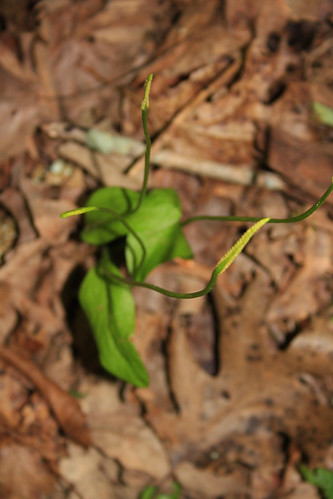
Southern adderstongue, Ophioglossum vulgatum.
(*photo credit)
June 12, 2012 Reasons Why Being Poor Can Be Enriching
On Race Unity Day we find a key to coming together in solidarity. Our title does not say being poor is always enriching, for some do not see it that way. Rather, possibility exists that poverty can be enriching provided it is not destitution. The possibility is improved if we are closely associated with those who struggle for their livelihood -- the worker, the ill, the prisoner, the ex-addict. During the last twenty months I lost all three of my valuable editors to three different types of cancer. In sorrow the Lord speaks: "These enriched you very much by their technical skills, insights, and intelligence, but you must remain poor." Yes, my editors were not replaceable, and I truly felt impoverished --but we are able to discover Christ impoverished and yet paradoxically enriched among and with the poor.
Spiritually, we can only trust ourselves so far. Our trust must always turn to God and find there the fullness of who we are.
Spiritual enrichment means growing sensitivity to and with others.
Ecologically, we have far less maintenance when poor, for there is not all that property to maintain, guard, ensure, and drain precious time that can be spent in other ways.
Educationally, we learn so much more when we listen carefully to what the poor do and say. This is God's great source of inspiration and the teachers of a new world order.
Practically, poor folks teach all to do with far less and to be far more creative in using what we have.
Inspirationally, we find the will of God in what we do and know that God's power is at work among the poor; the Lord tests us to meet our challenges through his empowerment to us.
Psychologically, it is enriching not to have to battle the pretensions of those who think they are better than others, and that their "success" is of their own making.
Economically, a just world in which resources are shared leads to a greater solidarity, especially among very poor people.
Culturally, without sharing, the world cannot stay civilized but will descend into the depths of insatiable materialism.
Realistically, being among and identified with the poor, allows others to discount my importance, thank heavens. Many find one who is poor is not worthy of much time or attention.
Gratitude comes more easily when the little we have is seen as a gift from God and not our human efforts. In fact, the opportunity exists for the poor to constantly find God in everything in life.
Humorously, we see that God does wonders with us when poor in ways not attained by those with unlimited resources.
Health-wise, downsizing is not any longer a problem, and so the stress to lower expectations is not present.
Motivationally, striving spiritually places part of the onus outside us; we are freed of the rat race to become satisfied with insatiable materialism.
Prayer: Lord, thank you for the poor who inspire us to move the world to a new level of social justice.
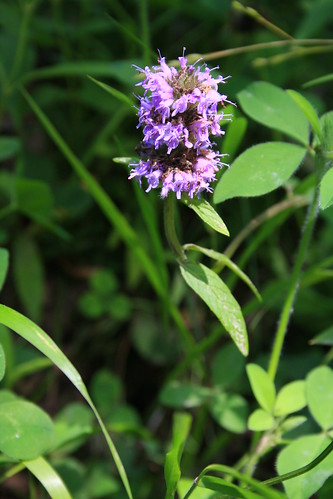
Hairy wood mint (hairy pagoda-plant), Blephilia hirsuta.
(*photo credit)
June 13, 2012 Voters' Dilemma: Citizenship and Discernment
The Second Vatican Council exhorts the faithful "to perform their duties faithfully in the spirit of the Gospel. It is a mistake to think that, because we have here no lasting city, but seek the city which is to come, we are entitled to shirk our earthly responsibilities; this is to forget that by our faith we are bound all the more to fulfill these responsibilities according to the vocation of each one." Pope Benedict XVI
The possibility exists that we are going into a booth this autumn to vote on one or other candidate and we will not want any of the above. Should we refrain from voting even if this is not the mark of good citizenship? What do we do? Close our eyes and point and cast the ballot? That is certainly not the best, is it? Then what? One answer is not to get that far without making a decision, for the booth is not the place for discernment, only for assuring that you put the "x" in the proper decided place.
What do we do if we have two opposing candidates, neither of whom is perfect? In one case, we may disagree wholeheartedly but we truly believe the person will change under the pressure of later political action. However, the voter may disagree less with an opposing candidate but be fairly certain that self-righteousness or peer pressure on a particular candidate once elected will not permit much future change. These are matters of political judgment and all factors in wise and prayerful discernment. A vote in such circumstances for the less currently suitable candidate considers the dynamics of political life and growth in understanding that is so required during the political life ahead.
The discernment process then should include the following when choosing well:
* weighing existing materials and positions and records of candidates and taking sufficient time for proper choice (not just inside the ballot booth);
* weighing all positions of the various candidates;
* considering all factors that involve choices of life and death and not just one or other -- a consistent pattern of the web of life (see May 23, 2006) is one such consideration;
* regard the dynamics of change from the point of view of the candidate, and whether this person is free from pressures of money or influential pressure groups;
* consider past voting records or other positions held by the candidate that would add up to a totality that indicates future performance; and
* consider one's gut feeling especially if a position held by a candidate is honest and worthy of respect even when different from one's own.
Prayer: Lord, the coming American election is quite important from the viewpoint of our country and the world; help me to make a wise decision and to assist others to do the same.

Catching the breeze.
(*photo by Rob Rogoyski, Creative Commons)
June 14, 2012 Flag Day: Patriotism and World Citizenship
Americans on this Flag Day show special respect for our most precious national symbol, our flag. Millions of our fellow citizens have had tearful eyes when coming back home after a time lapse, and seeing "Old Glory" waving in the distance. There is a moment of solidarity with, just as the continued flag at the Baltimore fort inspired Francis Scott Key to write the "Star Spangled Banner." However, the stirring of some of us to the music and sight of a waving flag may make us reflect on sacrifices of those who fought for our independence or sacrificed for others in the Civil War or other national catastrophes or disasters.
Heroism and sacrifice is part of the flag's red, which symbolizes the blood of those who gave their lives for our country. But did not their sacrifices have still broader dimensions worth exploring when we study American or world history? The flag's white is our willingness to share the plenty of fields white with the harvest with those less endowed with resources. The blue symbolizes the horizon of dreams to always look for ever greater destiny. Red, white, and blue color the banner and our own hopes and aspirations.
Sacrifices, gratitude for plentitude, and trustful foresight are only some of the American characteristics needing emphasis. Another is the self-confidence to extend freedoms and goals of our country to people in other lands. It is not needed that we do this in a military manner; extending freedom can occur through radical sharing and allowing others to develop their destinies in their own way. Our responsibilities are shared because this is a global enterprise; we must work together to tackle the environmental and financial problems that we share as world citizens.
The movement from independent colonies to one United States was an extraordinary moment in world history; the movement in European nations to a European Union, and further down the line in Africa to an African Union, are journeys that are similar to the way our colonies evolved over time. This evolution ought now to be celebrated in an openness to becoming an ever greater and more perfect global union. The flag's field of stars representing different states shows an accomplished fact on one level.
Flag Day is an opportunity for a minor celebration; it is an annual reminder to seriously see the flag for what it is and how it is to be shared with a needy world -- not an exclusive sign. Flags have their limits, if as symbols they distract us and lead to a selfish nationalism that hold back true globalization. At times, such seems to be the case. Nationalism can hold us back. When we reflect on the true meaning of this emblem it may bring us forward.
Prayer: Send your Holy Spirit upon our beloved country. Make us people of faith in times of uncertainty, people of hope in times of trouble, people of compassion with those who are less fortunate, and people of peace in our homes, communities, country, and world.

A quiet place for reflection, with Aldo Leopold Bench (building plans here).
(*photo credit)
June 15, 2012 God Is Love
Anyone who fails to love can never have known God, because God is love. (I John 4:8)
On the Feast of the Sacred Heart we once again consider God's love that radiates throughout the world and is focused in the loving heart of Jesus who came among us, suffered, died, and rose in glory; this is the shining burst of Divine Love that illumines the world. God gives to each of us who prays for the power to love, the blessing of sharing more in divine life. Many friends near and far seek rational explanations for the cosmos around us and happenings in life -- and we seek to speak about God to them for we want to share. The power to share is found in love, for too many have love-hate struggles in their personal journey of life.
In John's letters we hear that God is love, but what does this mean? This is more than a four-letter word. To hold that God is love points us more to the meaning of love than about God -- for God is beyond our comprehension. On the other hand, love can be experienced to some degree in our lives with others. Those who hate have no knowledge of the dynamics of the world, for they do not experience the force pulling all together or the magnetic power of love itself. To say "we love others" is to discover a bond that binds us to them and in fact binds us to all. Love holds us, engulfs us, gives us meaning, and amid it all gives us direction to ever greater love.
Love is at the heart of all we are and do; if one loves, then what is expressed is that love that includes compassion for others who suffer in some way. Through suffering with another we show love, and express it in a way that the suffering person understands -- heart to heart. We do this in the arena of personal relationships that bind one to another and to another, and on ceaselessly so as to partake in God's Love that permeates all. A failure to express in words may be far more than compensated by a loving service that speaks louder than words -- a service of fidelity and caring and compassion. Loving service extends the love of our hearts to others, and through loving others we show that Love is a personal relationship that invites back their love in return. By loving others we are godly, because God IS love.
Some find formal theology difficult and yet give themselves in love to the needs of others. They have found God and yet do not have the words to express it. Failure to articulate may only show human limitations, not a lack of an informal theology; through love God is present in our midst giving us the enthusiasm (the God within) needed to continue. Mere knowledge without love is hardly theological for we cannot talk about God to one who hates. If we love, then love is eternal and never erased; we are on the road to knowing God who we cannot grasp, but rather God grasps us.
Prayer: Lord, help us see you as the totality of the ocean of infinite love. Help us see that by diving into this ocean we are
immersed in your love binding us to the Loving Heart of Christ.
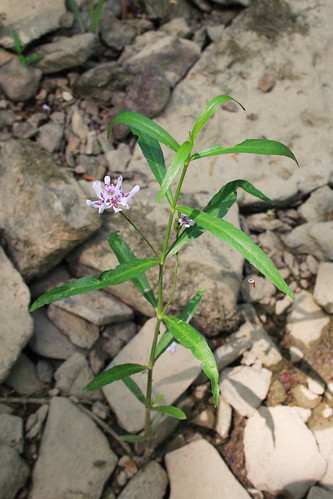
Water willow, Justicia americana, along a Kentucky stream.
(*photo credit)
June 16, 2012 Why We Must Repeat the Motto "In God We Trust"
Sometimes we say prayers and mumble words without thinking of the deeper significance. We see our national motto on every coin and bill we handle and this fits into the category of the unthinking mumbo-jumbo of daily recitation, or occasional imploring at a patriotic ending of a talk. "In God We Trust" deserves more.
First of all we need God in American life, for we have a national need to admit guilt for wrongdoing to our own, to other people, and to Earth herself. Americans take pride in our own self-righteousness and pretend that we are great through our own efforts. We as a nation are addicted to oil, autos, and all sorts of consumer products, and seek mightily to become all the more addicted through a recovering consumer economy bent on material excess. In coming to our senses we need to see that we cannot trust in human efforts alone; returning to trust in God is a key to the success of a people and a world. The brightest economic experts do not have the key. We cannot do it without God.
Our motto goes back to the American Revolution or at least the second War of Independence (War of 1812). See Flag Day on Tuesday's reflection about the "Star Spangled Banner" where the motto appears in the final verse. England was a powerful though somewhat distracted nation by the height of the final phases of the Napoleonic Wars in continental Europe. However, the forts occupied in our American Northwest territory, the capture of the city of Washington, the Canadian campaigns, and the final battle of New Orleans all added up to be a major threat to the existence of our young nation. Americans knew that it could not win without the assistance of divine grace. We need the same understanding today.
Today we ought to return to our motto with prayerful hearts. We have to confront the existential threat to our quality of life by financial mismanagement, as well as our unwillingness to address the global climate-change issue. We must reject the materialistic economic system in which we have placed our trust. Furthermore, we neglect to see this materialism as a false religion of which our country is a global proponent.
We must break loose, and say that this economic system causes the insatiable lust for more material goods. Such a quest consumes our energy, our time, and our entire psychic being. In addition, this false philosophy has a deadening effect on the vitality of Earth herself. Tens of millions in Asia, Latin America and throughout the world want to be like consuming Americans, so addicted to material things that they are simply unaware that they cannot pull themselves up by their bootstraps. Only by pleading to God who can save us will we find an answer -- before it is too late for us and our world.
Prayer: Lord, you have always been with us. Be again at our side and help us address our wrongdoing, and see the greatness of our nation in the trust we give you.
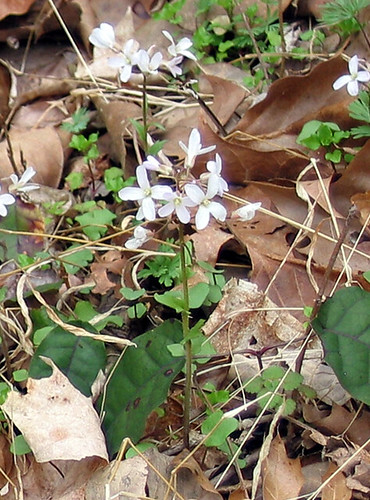
Purple cress, Cardamine douglassii. Mustard family.
(*photo credit)
June 17, 2012 The Mustard Seed Becomes the Largest Plant
It (kingdom of God) is like a mustard seed, which at the time of its sowing in the soil is the smallest of all the seeds; yet once it is sown grows into the biggest shrub of them all and puts out big branches so that the birds of the air can shelter in its shade. (Mark 4:31-32)
We must recall that this is a parable about the growth of the mighty kingdom of God starting from a tiny beginning; it is more than a gardening lesson interwoven into a parable by Jesus. Once I observed a humble mustard plant in my greenhouse, which normally reaches a height of two feet when flowering, continue to grow to be the tallest herb I ever experienced. I remembered this parable and marveled at the height of the plant.
The use of biological terms helps us understand how humble beginnings yield to immense endings. Jesus is telling us here to do several things. Let us reflect when we sow seed, for this is a precious moment when the potential of a future fruition rests in our hands. The world is for us to behold in the tiny creatures, whether a pup, a seedling, or an infant child. In due time, these little ones will grow and that is a part of the miracle of life shown in maturation, and part of the sowers' confidence. The teachings and healing activities of Jesus would ultimately come to have a global impact, but that would not be seen in his disciple's lifetime or maybe centuries afterwards, but the power of the resurrection includes this gradual growth to a grand future. We are to sow seed that is small but can become part of God's glory, but we must believe it will come to be.
Another aspect is maybe a little far fetched, namely, our efforts at extending the reign of God allows other creatures to be able to seek and find protection through our efforts. The birds come and rest in the branches. If we sow a plant, this gives comfort to those in need whether human or the flora and fauna of our world. Our efforts may be more effective than imagined. Perhaps in building up the kingdom of God we discover something about the New Heaven and New Earth -- a structure in the making.
The last aspect really follows from sowing, having a confidence in the maturing process, and being at peace with all creation, and that is we will someday bask in the magnificence of God's reign. We will participate in bringing about God's reign not by simply standing passively by and watching in awe as the kingdom unfolds. The farming motif has a special importance, for farmers coax growth from soil through the work of human hands. We are called to participate within God's family to help build the kingdom, as builders and not as cheerleaders. We do more than sow; we tend the plants and bring them to fruition and glory.
Prayer: Lord, help us in projects in which we are involved; give us strength to help them grow into mighty structures to the
benefit of all participants in your mighty work.

Life at a snail's pace.
(*photo credit)
June 18, 2012 How Do We Exult the Lowly?
...And [God has] exulted the lowly. (Luke 1:52)
In this age God's work on Earth is done through willing human hands, and so we have before us a mandate to join in the work promised -- not by miracles of which we are removed, but by participation in building the kingdom. The promise made by Mary in the Magnificat is being fulfilled by those who believe most firmly that it is the exultation of the lowly that shows God's power. This is not by the "generous" gift of power by the wealthy, as though it is their power that will change the world. Thus, the key to a spirituality of healing Earth and reclaiming the commons must be a paramount belief in God's power within the poor taking what is rightly theirs -- truly a divine revolution. How is this to occur?
At a first level, realism drives us to the proper prognosis, for we must objectively see where we stand is the heart of launching our efforts. We must not deny the situation and opt to live in a world of fiction. In our realistic assessment of this stance we must reaffirm a belief in the creative power of God; life itself is a gift from God along with precious but limited time to work. Seeing this as opportunity means that gratitude drives us to find creative ways to use our time fruitfully -- a first level of any healing event, for it involves knowing the situation and sizing up our need to press forward in a realistic manner.
A second method is to size up or mobilize resources at hand to put into effect healing or renewal programs. Such renewal entails effort on our part with cooperation of those who understand -- and that is most often the poor. We encourage each other to take responsibility for our actions and to overcome differences and to cooperate in the task of rebuilding our social structures. It is not a time for excuses but one for getting our hands dirty in a joint undertaking. Constant reassessment is called for when mistakes are made, so that the reluctant will abandon excuses and find that they have a valuable role to play in the collective work ahead. A false humility is to say the task is too great and beyond the feeble efforts of the poor. Yes, while all must participate still a few must act as singular agents of change.
The third level is at the heart of exultation. Becoming poor in the fullest sense allows us to realize that we are addicted to the things of this world. A realization of our imperfections is to reach a degree of compassion that involves taking on the cooperative efforts not as an outside contributor but as a poor participant. To become poor calls for using the talents of all. Our joint efforts include redistributing wealth so that the good of all may be achieved without the privileges of the "noble wealthy" standing above a peon class. Exultation is to see that this rise is not for us to glory in privilege, but to share with all the greater privilege of being within the divine family.
Prayer: Lord, teach us to be of service to our fellow human
beings and to join in overcoming differences that may exist.
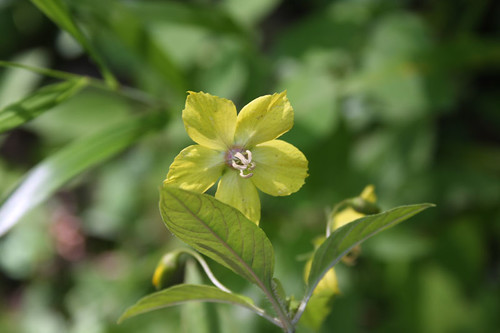
Lanceleaf loosestrife, Lysimachia lanceolata. Washington Co., KY.
(*photo credit)
June 19, 2012 First UN Conference on the Environment, 1972
-- Revised --
The discharge of toxic substances or of other substances and the release of heat, in such quantities of concentrations as to exceed the capacity of the environment to render them harmless, must be halted in order to ensure that serious or irreversible damage is not inflicted upon ecosystems. The just struggle of the peoples of all nations against pollution should be supported.
Declaration of Principles. UN Conference on the Environment #6
Time flies. Forty years ago, the first UN Conference on the Environment occurred in Stockholm, Sweden. Though memory fades, still several things stand out in that conference of four decades ago when the springtime of the environmental movement seemed so fresh. We naively thought that a few good regulations would send us on to other needed pursuits. Little did we know that issues discussed there in Stockholm would remain, and new ones far more serious would emerge. One eloquent Brazilian spoke on saving the Amazon Rain Forest, in prescient terms from what has become a major problem of the unregulated clear-cutting of "Earth's lungs."
During the two week conference several of us priests including the Vatican delegation concelebrated a Mass in Latin. One participant was the late fellow Jesuit, Bob Brungs, who directed the Institute for Theological Encounter with Science and Technology in St. Louis. It was also the time I was able to speak to Rene Dubos, microbiologist, writer, enthusiast, environmental pioneer, consultant, and model; he motivated me to write The Contrasumers: A Citizens Guide to Resource Conservation (Praeger Publishers, 1973). (See tomorrow's entry). At this Conference it became evident that small numbers of wasteful consumers (not sheer numbers of poor people) are the culprits causing environmental degradation.
I recall a UN-NGO panel composed of five white males. During introductions, an ample-sized Kenyan presented herself with a chair, and using powerful hips, made an opening at the panel's table. She said she represented women and the non-white four-fifths of the world. Half of us cheered and half were in a state of utter dismay. Also a Swede told me that the quiet gentleman sitting alone across the room at the NGO meeting was Olof Palme, the Swedish prime minister. I had never spoken to a head of state and so I went over and thanked the prime minister for taking time to grace the citizen's alternative meeting and he smiled. Later in 1986, when strolling near his home Mr. Palme was assassinated.
Over time, I have found that the inspirational value of global physical gatherings decreased. Tomorrow starts the Rio-20 UN Conference on Sustainable Development. More ought to occur through thoughtful Internet communication, for teleconferences are a new means of social contact and global sharing. They take less time to organize, and both use less external physical and psychic energy.
Prayer: Lord, bring us together in some fashion so as to understand and address emerging world environmental problems.
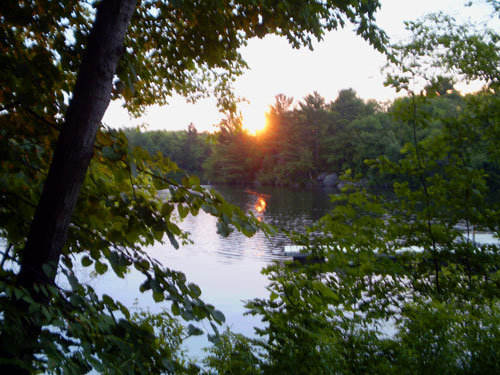
Patterns of light dance across Canadian lake as sun make an appearance.
(*photo by Mark Spencer)
June 20, 2012 Fleeting Time and Summer Solstice
Only rarely do I (or many people) pay special attention to the summer solstice event. The longest day for us as youth came when we loved the summer vacation time as part of something that did not appear to end. As one who simply despised formal education and its rigor, this was my season of shoeless and long-pantsless freedom; everything in June seemed so alive and full of life. In our minds it would never end, but then that tinge of reality would set in again for those of us who never believed in fairy tales. Summer just starting would end, along with freedom. Summer is fleeting!
The dream of endless life when enjoying some comfort extends to more mature people as well. We all dream of and crave endlessness or eternity -- a craving that is a proof that a merciful God wants us all renewed and believers in resurrection.
On Winter Solstice, we await the holiday period and the assurance that days will get longer -- and so hope springs eternal. Thus in some ways, even though winter comes after glorious and ever shortening daylight autumns, the promise of lengthening days fosters a sense of better times ahead. On the other hand, today's Summer Solstice speaks to the philosophy of inevitable decline and the end of life as we know it, and each day of the next six months will add to this shortening process -- a bitter/sweet mode.
Those beyond the summer of life are beset by the reality of slowing down physically, of reduced mobility in rising and reclining, of seeing pleasure trips as journeys, of good food as fattening, and of cool breezes as threats to health. Life is not only changing; time is perceived as accelerating as we advance in age: mortal life is fleeting. Physically, our time is measured in a clock of precise duration, with increments of days and weeks and years and centuries. Psychologically, our time is measured in memory and emotions and aspirations, and past recollections are fewer; thus the pace has less past history to it. Just as we were powerless to slow down the youthful summer and make it endless, so in old age we cannot slow down the inevitable faster pace to the end. Good health and residual ambitions may bring back youthful dreams, but while fleeting they have their elderly counterparts.
On deeper reflection, which is what this set of essays is all about, fleeting is a leaving something behind and a hastening to what is to come -- eternal life. The enjoyable hope can make time fly, though some may contest this point. I suspect that life goes more painstakingly slower for those who do not see eternity ahead as a promise, or who are nursing self-pity and too many unpleasant aches. They consider their pains and suffering as burdens rather than opportunities to offer their closing days for others. Yes, we are at the start of summer, but really it is the renewed promise of eternal summer without oppressive heat, mosquitoes, and tornadoes. Let's move on to the distant there and then and do so willingly.
Prayer: Lord, give us the clear vision of what lies ahead, and make this longest day of the year a prelude to eternal life.
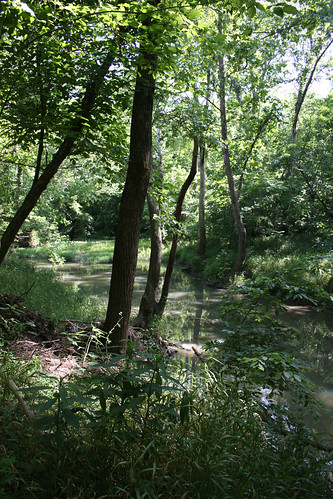
Sultry June afternoon along Kentucky creek.
(*photo credit)
June 21, 2012 We Need Models of Enthusiasm in Summertime
We are now into that warm season (hotter in recent years), as though we didn't already know. There is an old expression that if you stay "upbeat" amid summer heat, you are truly an enthusiastic person. In fact, our sense of enthusiasm was defined by people whom we knew were blessed in their labors with a sense of energy that influenced all whom they encountered.
Two examples for me, my father and Rene Dubos, were in some ways very different but deeply enthusiastic. Both were bright and saw a bright world ahead after passing on; both were of French descent (Rene Dubos was born there as were both my father's parents) but came to enthusiastically accept the American spirit; further, both were born and died in the same years (1901-1982).
Rene was an accomplished microbiologist who embraced the environmental movement and wrote several notable books including The God Within, which is what enthusiasm is, in its root meaning. The professor gave me initial support in that first writing of mine "Theology of the Earth" and really launched me on my lifetime priestly career. As a consultant for our fledgling public interest center, he inspired us during some difficult early struggles.
My father was equally enthusiastic and yet, without writing or academic skills, helped hold me to environmental work through support in numerous ways. Being highly skilled as a craftsman of soil, wood, metal, and technical design, he built a solar food dryer for our new appropriate technology center and spoke about placement of buildings at the original site in Rockcastle County. He supported us morally and financially.
Both of these mentors for theory and practice grounded their enthusiasm in a deep faith: both rejoiced in our collective liberation by Christ (an event rooted in the past), a shared anticipation of greater things to come (anticipation of a bright future), and a profound sense of inner peace to carry on regardless of current shortcomings, including summer heat.
While both these enthusiasts died thirty years ago this season, still their spirit endures. We are heirs to enthusiastic witnessing to the God who dwells within us. This becomes ever so important because I meet people of faith who struggle in our troubled times. I wonder whether they are overwhelmed by the trial and forgetful of the enthusiasts' sense of opportunity present. On the other hand, are they triggered by creative thoughts to discover ways to share with others? God's sharing with us becomes the grounding of our sharing with others; the challenge is to do this with limited resources, knowing that our trust in God is the insurance it takes to bring out fully what is within.
Prayer: Lord, help me manifest a special effervescence for others to see; only make us aware that your presence will make the power of the risen Lord -- Emmanuel -- triumph now in our work.

Queen snake, Regina septemvittata. Mercer Co., KY.
(*photo credit)
June 22, 2012 Appreciating the Miracles of Life
We are not to expect miracles but they sure are nice when they just happen to come. Question someone on a pilgrimage to a holy place such as Lourdes and you will discover their quest is for physical and/or spiritual miracles. An exhibited crutch or other medical paraphernalia or the personal testimony to some miracle could indicate that unexplained happenings occur. However, it is quite possible that a host of unexplained events are seen by some as miracles, whether as individual or group experiences.
Over the years near miracles have occurred in ours and others lives. In times of natural disasters some are miraculously rescued or avoid harm that could have easily occurred. Recall that during the intermission of one of Haydn's concert the audience crowded closer to the front to view the compose, and a vast chandelier came crashing down among the vacated seats; no one was hurt. Incidentally, the nicknamed "Miracle Symphony" was not the one being played at the time.
Twice in my life I experienced what I regarded as unusual events. Once while hitchhiking home, a truck loaded with railroad ties (that I now plainly visualize in the exact spot on U.S. 68) came with horn blaring, and I leaned back against the cable guard rail as ties whisked past my face; I could have been killed. Another incident in youth occurred on the farm when we were blowing fence post holes with dynamite on some rocky land; the blast had gone off, the rock pieces were already well exiting the hole and something (one) made me step back another ten feet, as a large rock fragment landed where I was standing. Furthermore, when I postponed a 1988 air flight to India, the plane I would have taken to Ahmadabad crashed. I could have died with everyone aboard.
These were not my times, and so I regard surviving as always a gift from God. Each reader has other vivid examples. We meet soldiers who experienced combat and they tell hair-raising survival stories of what they regard as the personal miracles of their lives -- they were to live when fellow young soldiers' lives were cut short. We all live and we survive when others fail to, and we ought to be thankful for the precious gift of life.
We observe an ant or a human being, and consider the complex of biological functions that must be coordinated within each in order that the organism functions properly and spontaneously. Every living beings on this planet survives in some way and this is utterly amazing, a miracle. I agree with Albert Einstein --
There are two ways to live your life. One is as though nothing is a miracle. The other is as though everything is a miracle.
Prayer: Lord, keep our minds in childlike wonder and, even if memories fade, allow this wonder to grow as we await eternity's unending glory.

A closer look at the oregano plant.
(*photo by Christopher Twigg, Creative Commons.)
June 23, 2012 Oregano: "Delight of the Mountains"
We have a focus each month at our local herb club on a plant-of-the-month, and my spring talk was about oregano, which in Greek means "Delight of the mountains." Since our Estill county is where "the mountains and Bluegrass region kiss," this became a perfect opportunity to defend the place of oregano in our repertoire of favorite seasonings and health aids.
Oregano, an herb of cooks' choice, is quite well known in America though originally popular in the Mediterranean region. We flavor pizzas and Italian and Greek ethnic meals with this spice.
Furthermore, its New World cousin is used in a host of Mexican and Latin American dishes as well. I must confess that having it fresh in the garden and with its pleasant scent and taste, it gets into my fresh garden salads and soups quite often. When eaten fresh the oregano leaves have a pleasant numbing effect on the tongue, a reminder that this herb is something special. Also recall that oregano is a close relative to the equally popular herb marjoram.
Herbalists admit that drying allows oregano's flavor to be enjoyed year round. However, it is a hearty plant and, with a little cover during mild winters, the gray-green leaves can be picked in any month of the year. Dry oregano keeps well but some say there is most likely a loss of rich anti-oxidants and vitamins with drying. Besides salads and pizzas we ought to extend use of oregano to cooked vegetables, fish meals, sauces, soups, stews, and omelets. I am including it as a pickling spice this year. I even add oregano to cornbread and find that it gives a special zip to the baked Appalachian mainstay.
Health benefits of oregano includes its anti-oxidant properties, a variety of vitamins (C, A, and K), beta-carotene, iron, manganese, and essential oils besides thymol such as limonene, pinene, and ocimene -- and more. Strongly antiseptic properties are attributed to the leaves and flowering stems. Oregano contains dietary fibers; the herb contains no cholesterol and is credited with moderating higher cholesterol levels.
Medicinally, I always hesitate with a certain ambivalence when it comes to herbs. The herbalists of old were right in finding benefits by using herbs after centuries of practical experience. Hesitancy comes from misuse of herbs that ought to be moderately taken. Modern Americans being subject to incessant TV drug advertising come to accept the philosophy that more is better
(recall damage done by overusing comfrey). Certainly, oregano oil is known to irritate the skin and mucus membranes. Oregano contains thymol, which is proven by scientific research to have antiseptic, antibacterial and antifungal properties. Oregano is a money saver if and when we are inclined to buy commercial preparations for colds, influenza, and indigestion.
Prayer: Lord, teach us to enjoy your gifts of health and taste and to know when enough is enough and when more is need.

Grasshopper, hidden among foliage of the iris plant.
(*photo credit)
June 24, 2012 John the Baptist: A Prophet as Teacher
I will make you the light of the nations so that my salvation will reach to the ends of the Earth. (Isaiah 49:6b)
The feast of the Nativity of St. John the Baptist falls about once every seven years on a Sunday and this takes preference over the 12th Sunday of Ordinary Time. Thus we celebrate the feast in a special way for this great prophet and hard-to-imitate person. Virtually all of us would find it nearly impossible to live in a Judean wilderness on wild honey and grasshoppers, or to wear the coarse clothing of which he covered himself. Apart from specific culinary and lodging conditions, we look more closely and discover some elements in John's life that are meant to connect with us -- and even teach us proper ways of acting:
Joy -- John leaps for joy at the arrival of Mary with Jesus in her womb. We ought to find excitement and happiness upon the arrival of a new person. Do we try to make new arrivals comfortable with a joy-filled hospitality?
Uniqueness -- John's birth is a dramatic event on par with that of Jesus at Christmas through the narrative of his unusual arrival. John withdraws from the world and lives simply as the Spirit calls him to do. Do we follow the prompting of the Spirit?
Humility -- John realizes in the presence of Jesus that he is to fade with the rising star of the Messiah coming into full view. We need to be prepared to make ready for others to receive the Lord and yet accept the fact that our efforts may go under-appreciated or unnoticed. Are we willing to accept that the fruits of our work will come after we have departed this world and not now?
Forthrightness -- John is a free spirit and speaks plainly to the people; he lives simply through both word and deed. John is the right person at the right time and plainly tells others what will happen if they do not reform their ways.
Courage -- John does not hesitate to tell the erring King what he has done wrong in his life -- and for that reason John must take the consequences of imprisonment. Are we willing to speak honestly no matter what the truth may cost?
Light to Others -- From unusual birth to a martyr's death, John is a forerunner of what we all ought to become, and yet we do not have to imitate him in specifics, only in the qualities that can reappear in our unique time and place. Do we leap with joy at the coming of the Lord, affirm the mystery of life through reverence, live simply so others may simply live, become prophetic and speak out about the need to make changes in our world, and stand willing to witness to what God calls us to be and do?
Prayer: Lord, help us to learn from events in the life of John the Baptist; make us also heralds of Good News.
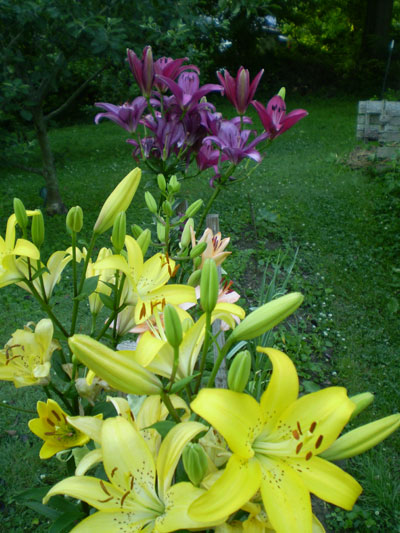
Floral garden of Earth Healing's Fr. Al Fritsch.
(*photo by Mark Spencer)
June 25, 2012 An Emerging Eco-Spirituality
Every earthhealer needs a spirituality. Better yet, every earthhealer HAS a spirituality. The challenge is to see that this spirituality suits the level of awareness on which healers find themselves at a given time. Just as an elementary eco-spirituality expresses limited awareness, a maturing spirituality reflects both the growth in awareness of a deepening environmental crisis. A "spirituality" is a character or quality that underlies our actions and includes a motivational force coming from within and through the imploring of a Higher Power to assist us in acting. Our "eco-spirituality" is generally a sub-set of a comprehensive personal spirituality; this pertains to our relationship to matters of ecological significance such as the motivational force that helps us appreciate the world of plants, animals and landscape.
An authentic eco-spirituality was discussed two decades ago (see "Towards an Authentic Eco-Spirituality" on this website); however, the basic three principles are still operative though more urgency now is on the second level and on the cooperative efforts of people at the third level. The three basic principles are:
* The goodness and interconnected relationship of all creation;
* The sensitivity to the power of suffering; and
* The willingness to be open to participation by all people.
Each level is a growing environmental awareness; each has a specific action-oriented spirituality emerging that points to the relationship between us as healers and the Source of our spiritual life. At the first level we see the beauty of creation being damaged by exploitation; HERE the connectedness of all creation is forgotten by exploiters and their misdeed exposed by prophets.
At the second level, the suffering of all our brothers and sisters leads to compassion NOW, and motivates agents of change to offer alternative procedures to counter the devastating effects of exploitation. The crisis takes more than exposure and remedial alternatives; for authentic renewal a new economic system, which discourages excessive consumption, is necessary.
An unauthentic spirituality crops up all too often, for even the devil pushes spirituality in his own way. The relationship among all beings is denied by those who focus totally on themselves or specific human relationships, and ignore the importance of others including the flora and fauna of our lives. Also those who take no responsibility or see no value to suffering, and prefer to regard material things as only useful in themselves fail an authenticity test. Compassion is foreign to such people for they are insensitive to the impact of their actions on others. And those who prefer to focus on escape mechanisms fail to see the need of teamwork in repairing a damaged world.
Prayer: Lord, help us to open ourselves to a deeper commitment to help bring about the global changes necessary in our world, to see what must be done, to take steps to take corrective measures, and to attack the unjust system causing the environmental crisis.
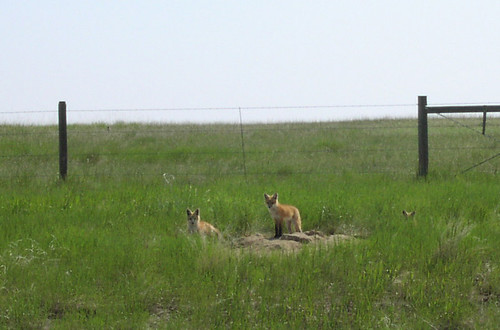
Red fox family (Vulpes vulpes), Montana.
(*photo credit)
June 26, 2012 HERE: A Down-to-Earth Spirituality
A "spirituality" is what inspires the person to act for better or worse. An "eco-spirituality" relates to matters of ecological significance such as the motivational force that moves people to focus on the environment. The concept of eco-spirituality is in a process of evolving at this time. At each level of environmental awareness focus is on specific actions that demand attention in order to act in an authentic spiritual manner.
A first level, Down-to-Earth Spirituality, focuses on clarity in seeing environmental damage and some movement to saving a wounded Earth. It involves a willingness to pause and prophetically expose misdeeds, which are at the local level and may stretch beyond. Authenticity involves personal experience grounded in touching one's land, knowing one's wildlife, and coming to an appreciation of nature. This approach does not borrow spiritual insights from distant academic or erudite sources. On this level, an environmental perspective is relative to location of observer and response is unique to their current place on this planet.
Some, especially the less committed to place or those committed to exploiting the particular place, may dismiss the need to be deeply rooted in one's environs. However, at home we discover harm that hurts us deeply, we take notice, and we begin to move to doing something. We abandon the world of fiction and stare reality in the face. We know where we are, what we eat, and where the horizon out there is in relation to our location, our stance, our mood, and our ambitions. This is not grounded in an alien spirituality that defines how we are to save the environment through change of rational attitudes about creation. Rather, nature touches me as an individual where I acknowledge guilt as a primary penitential rite. Suddenly the HERE faces us in all its raw reality, and danger is very close. If I am not an immediate culprit, I am part of a tolerant community that must act.
Being "Down-to-Earth" in a unique place is conditioned by where I am, when I live, and with whom I associate. Reality includes knowing weather conditions, wind direction when berries and fruit ripen, length of daylight, and seasonal changes. Being down-to-Earth includes a willingness to live a sustainable life using local resources. Due to my particular time, place, and association, my spirituality is unique to me, and if I move about this will change in time. I must open my eyes and not run from the current situation nor deny that it exists. For better or worse I am chosen from all eternity to be present in this time and place, and regard this with both trepidation and promise. The mix of the two energizes my response to what must be done in this place.
Prayer: Lord, teach us to be Good Samaritans and to pause and look upon a troubled world as victim and be willing to not pass by but to assist in whatever way possible. Help us to be authentic and give from our heart in whatever way possible.
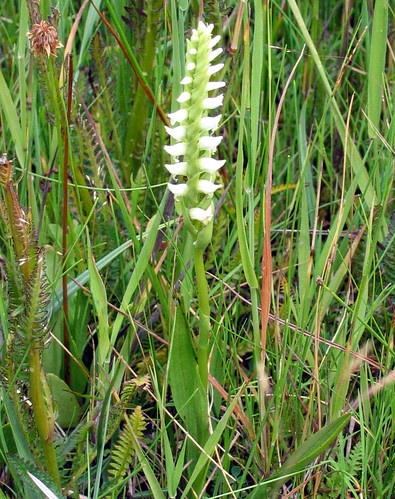
Ladies' Tresses, Spiranthes diluvialis. Laramie, WY.
(*photo credit)
June 27, 2012 NOW: The Spirituality of Compassion
The second and deeper level emphasizes that our responsibility results from the original environmental awareness and a growing sensitivity for our brothers and sisters who are victims of misdeeds. Repairing our wounded planet calls us to reclamation, resource conservation, sustainable development, and renewable energy promotion. This suffering-with-others is a spirituality of compassion that involves a growing sense of responsibility to repair environmental damage.
A spirituality of compassion or suffering with others becomes a central motivating force. The damage hurts us, and we are sensitive to a damaged creation whose God-given beauty is marred by human misdeed and selfishness. We are pained by the plight of the fallen and seek to be a Good Samaritan. This means we must give immediate assistance to those suffering -- humans and all other wounded creatures. Our responses are not perfect and that makes us all the more humble and willing to experiment and improve through different techniques. Compassion is a planetary experience, and our growing sensitivity moves us to do something about it right NOW. Urgency grows, and we are unwilling to excuse ourselves and expect others to dress the wounds of Earth. We are responsible.
The opposite of this spirituality of compassion is a selfish material affluence that leads to greed. Often the affluent pretends to be so privileged that their use of resources are best managed by themselves for the "good" of others. The affluent excuse themselves for one or other reason ("not my job") just like the priest and Levite who passed the victim in the Good Samaritan parable. No problem, no blame, no need for pause in the journey in pursuit of affluence. This fictional world of "classless" affluence results in being spiritually ethereal, hesitant to look at human causes, and unwilling to get dirty hands and feet. In truth, uncontrolled affluence ruins individuals and Earth herself.
The insensitivity that is counter to compassion can gain credence and followings from those hell-bent on imitating the affluent at all costs. A struggle results. We see and fight for those who suffer but who are somewhat removed from us, because they are the victims of a dysfunctional system. Quite often the Good Samaritans even desire a stance that is healthy and mobile and active and always prepared to help others. Thus there is a "they" who are near but not yet a "we" because the victim is seen and assisted but not integrated into the actual life of the healer, who may be a technical expert or professional agent of change. These helpful folks have a role to play in changing our world, but more engagement is needed as well, and thus we delve into a still deeper level of awareness, an act of humility in which "they" become "WE."
Prayer: We thank you, God, for giving us the gift of being born and living in these troubled times, and the opportunity to address these conditions. Lord, infuse us with the compassion of
Christ.
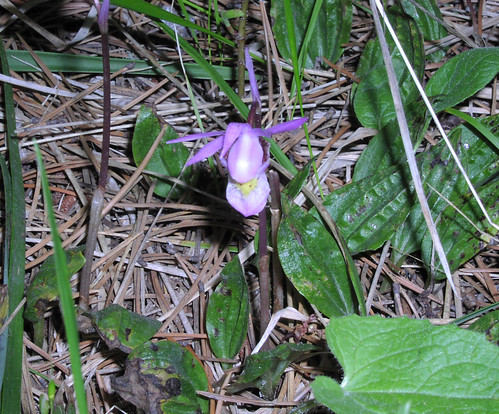
Calypso bulbosa, Calypso orchid. Cypress Hills Interprovincial Park, Canada.
(*photo credit)
June 28, 2012 WE: A Resurrection-Centered Eco-Spirituality
The magnitude of the problems facing us calls for teamwork and participation at a global level. Seeking renewal involves accepting ourselves as poor and addicted, and thus accepting part of the blame. We must deepen our journey of faith. Acknowledging social addiction moves us to trust in God and thus discover an empowerment found when aware of our own powerlessness and willingness to be renewed by the Lord.
An expanded eco-spirituality must incorporate the awareness of damage done through a prophetic call (level one) and the taking of responsibility to take corrective measures by agents of change (level two); however, a still deeper awareness involves confronting the dysfunctional system that is causing the environmental crisis, and our taking charge of the situation. This means focusing on the consumer economy that entices people into the insatiable rat race of acquiring more and more material goods, with its accompanying use of resources and resulting environmental pollution. This materialistic greed fuels a dysfunctional economic and political system and encourages a plague of insensitivity towards those not yet in the rat race. The paralysis of the current world order for resolving overuse of resources is unacknowledged social addiction. The crisis grows along with a lack of spiritual will power to delve more deeply. Partners are needed to help at a global level, a WE.
In the moment of global desolation we strive with divine help to find ourselves; we look about; we discover our weaknesses and ask basic questions. If we are addicted to the materialism of our culture, then have we lost power to become self corrective as addicts? In this powerlessness we discover our social addiction. Strengthening our faith at ever deeper levels is part of the evolving human spirit beckoned on by the Divine. Acknowledging social addiction becomes a sacred moment of decision, a time for renewal. In the entry into the Pascal mystery of a suffering Earth and the compassion sought, we discover our own weaknesses and inability to do this by rational observation and remedial tweaking of the current system.
This third approach has several elements: acknowledging our inability to solve problems alone; forming a solidarity with others (a WE) includes integrating with the poor and thinking alike, so that ex-addicts become models; seeing our inadequacy and forcing us to fall back on a Higher Power (12 step classic Alcoholic Anonymous program); reclaiming the motto "In God we Trust"; accepting all assistance at our disposal (for Christians this means sacramental nourishment); making ourselves leavens of change to bring about a new social order; and practicing a renewed spirit that furnishes the enthusiasm needed to carry on our work in rebuilding the social order. Refer to "Reclaiming the Tenth Commons, In God We Trust" on this website, part of our work in progress, Reclaiming the Commons
Prayer: Lord, teach us to be Easter people with the
enthusiasm that is needed to renew our troubled world.
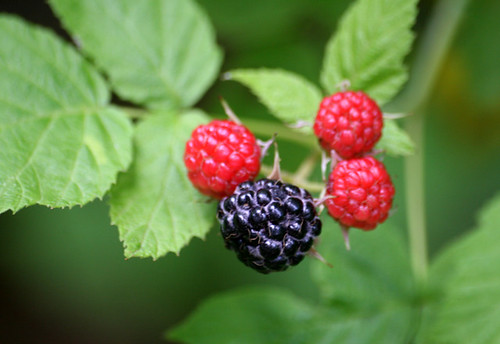
Sun-ripened wild raspberries. Harlan Co., KY.
(*photo credit)
June 29, 2012 Invasive Wineberries and Other Seasonal Cousins
The season of wineberries approaches. These are wild raspberries of Asian origin. They have been introduced to Europe and America (some say by Thomas Jefferson), and are exotics that turn invasive. Where found in the coming weeks, pick and eat in the patch, for that is most satisfying. I plan my annual retreat during the height of berry season just so that daily during that period I can retrieve a few wild berries to enhance my communion with nature. Besides the season of the wineberry, it is the height of the blackberry season as well and the time of some blueberries and huckleberries. My favorite wineberry patches at the nearby Natural Bridge State Park have been progressively removed due to the Park's relentless war against invasives. Fortunately there is a tiny private family cemetery within the park boundaries and here the surface is overrun by good wineberries.
Going beyond wineberries, I include here a sampling of the vast berry world with hopes you venture there from time to time. These berries have different seasons depending on variety and the micro-climate of the growing location. In some ways the season has already begun here in June having included the wild and cultivated strawberries and it is well into the wild raspberry picking time as well. Other berry times are in the launching stage and my first blackberry picking has always been in the latter part of June. When young, we gloried that we had a market for a gallon of the precious berries for twenty five cents. They are priced higher on the market today but quarters are far less treasured now.
As I advance and grow out of the patience and stamina to pick berries, I yearn for a few handsful to satisfy the season's taste. Heat and briars and access and all the lack of comfort in picking have shortened my ventures through the years even for the highly prized blackcap raspberry. This is also well into the mulberry season and these firm but tart berries are really a delight for those who like variety, and all kinds of mulberries fill the berry smorgasbord.
A major portion of wild berries, especially the multitudes of blackberries and dewberries go unharvested or become the summer food of birds and wildlife. I had a dog once that loved blackberries, and I would pick with my left hand for her and the right hand for myself in a proper hygienic fashion. The many cultivated berries such as boysenberries, loganberries, lingonberries, and gooseberries cannot be discounted, nor the variety of both wild and cultivated blueberries that are now coming into season. Harvesting a pint for those who are unable to pick is always an appreciated gift. Blueberries are thornless, a double blessing. In autumn we pick elderberries, the closing of berry season -- not much for wild taste but actually wonderful in pies and wine. Don't forget the cranberries for our winter feasts.
Prayer: Lord, curb our busyness so we welcome berry season, and indulge just a little in the joy of satisfying our taste buds.

Tiny pollinator, at work.
(*photo credit)
June 30, 2012 When Do I Think Small? Think Big?
Scripture says there is a time for everything under heaven, and certainly that ought to apply to the breadth or narrowness of our capacity to think. Suggestions are in order;
Think small when --
There's a long way to go and my feet are aching;
Someone is bragging and lying at the same time;
I forgot the wallet and I only have change for lunch;
The audience tells by their looks to move on;
I'm concentrating on the last mile before the storm;
Just got one thing to remember, and I forgot what it is;
The person in the coffin always seemed bigger than life;
I'm trying to read small print before the title changes;
There's no kid around to help open the child-proof lid;
The fuel light came on and no filling station in miles;
The food budget is gone for the month;
It's time to introduce two people and I forgot one's name;
They expect an answer when I didn't hear the question;
Agreeing to a meeting and didn't hear what it's about;
The rumormonger is speaking about "me";
Just trying to smile;
The shocked look means I must be in the wrong restroom;
All I want is that one last pickle; and
When trying desperately to enter the candidate's mind.
Think grand when --
Saying "Yes, we can" -- and mean it;
Praying for guidance;
The storm is past and the rainbow appears;
Strength returns after a bout of flu;
Carded at 39;
The fellow giving directions says "You can't miss it";
The scale with weak battery is giving an underweight;
Someone under-guessed my age by one decade;
Receiving an unannounced compliment or a "Thank You";
Mistaken by another for someone you admire;
Junk mail says "you won" and I forgot it was junk;
Getting home from the big city and survived;
Assured that the Lord loves everyone;
The local mockingbird included my bird call today;
Opening door to permit the exhausted sparrow to escape;
Seeing "The End" during a rotten movie;
Seeing the first light in a red sky;
Pulling the lever in the voting booth;
Passing up the tempting dessert with will power; and
When starting resolutions over in the second half of 2012.
Prayer: Lord, may we think always about you and how our own life is to be balanced. |